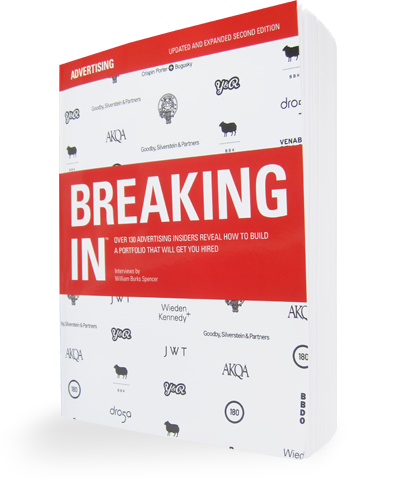Check out some great work from Richard Bullock.
WS: Do you care if a book is full of sketches, or do you like to see finished, comped-up work?
RB: Historically, a lot of people go around saying, “Oh, we should just do sketches and that should be fine,” but the reality is that times have changed and if somebody has an ability to use the tools that we have now, a computer, a Mac, to do things up, if you have those skills you should demonstrate them. Because putting things down in a nice way is what clients kind of look for now. It’s like saying, “Boy wasn’t it nice when we could write beautifully with quill pens”; it’s just not the reality anymore for clients. And if somebody has also collaborated with an art director, and you’ve seen that come out through the work, then the more the student can hit the ground running and have those skills, the more valuable they are to the company.
[ … ]
WS: Do you think it’s important to include things that aren’t ads in a book?
RB: Yeah, I think it’s really, really important. I think if people have anything that they do on the side, or if they’re into designing their own T-shirts, or they’ve written a short story, or they’re into illustrations and drawings or sketchbooks or photography, anything that shows their way, that they observe the world and their interpretation of it, is valuable. It shows that the person is a natural creative. And what we look for a lot is that advertising is one way of being creative in business. But there’s a lot of ways of being creative. And the best creatives are the ones who, if they get advertising taken away, then they’ll start fashioning a freaking birdhouse or something because they just have to be creative.
And it’s not just about showing how cool you are, it’s about expressing that you’re a natural creative person. And we really look for that in people, to see that it just comes out of them no matter what. Because then we know that if they come into work in the agency, even if they’re faced with knock-back after knock-back, or it’s hard for the client, or the client is being really tough, the naturally creative person will just keep going, because that’s inside them—they just have it. But the person who’s in it because it’s cool to be in advertising, or they want to win awards or something, will fall by the wayside, compared to the natural person. And the natural creative will also look for solutions that aren’t just around them in the world of advertising.
WS: Do you have any tips for someone who is just starting out?
RB: The best way to improve is to be around an agency at any cost. To try and get in and work, and find somebody who’s an advisor and listen and get in, just get in somewhere to get work experience, I think. Even if you can’t get an actual job, just get in and work for free, and visit agencies all the time and show your book, and get your book looked at and commented on by different people. And you’ll soon realize that, first, there are a lot of different opinions, but you’ll also find people that you really like and respect. And one or two mentors may well be the difference between getting into the business, or not. You know, finding that person that wants to help you and push you along.

Comments are closed.